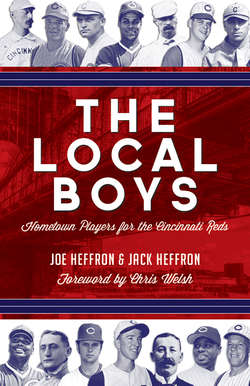Читать книгу The Local Boys - Joe Heffron - Страница 22
На сайте Литреса книга снята с продажи.
AMOS “DARLING” BOOTH
ОглавлениеAUGUST 14, 1848–JULY 1, 1921
Major League Career
1876–1882
Time as a Red
1876–1877
Position
CATCHER; INFIELD
LIKE MANY BASEBALL PLAYERS OF HIS ERA—and even today—Amos Booth was superstitious. He bought into the common belief that if he found a hairpin at the ball yard before a game, he would get a hit. Apparently he didn’t find a lot of hairpins. He certainly didn’t get a lot of hits. Born and raised in Lebanon, Ohio, the son of George and Eleanor Booth, he starred for the town’s well-regarded amateur team in the early 1870s, which may have been how he came to the attention of the newly reformed Red Stockings, who signed him for their inaugural season in the National League in 1876. He debuted on April 25, 1876. If not especially gifted, he was versatile, playing every position except first base and center field. He even pitched. While mostly a backup infielder, he became the first pitcher in National League history to give up two home runs to the same hitter in one game—to George Hall of the Athletics on June 17, 1876.
Though he only played in 110 major league games, Booth managed to post a few other firsts: In his debut game, he got the first hit by a Red as a member of the National League, smacking a single in the first inning in a 2–1 Opening Day victory over the St. Louis Brown Stockings. Later in the game, he scored the team’s first run in NL history; he also was the first player in the league’s history to both catch and pitch as many as 10 games in a season. In several games, he started out catching and ended up pitching.
Listed at 5′9″ and 159 pounds, he was light even for that time, and at 27 years old when he reached the majors, he wasn’t young. He batted .261 in his first year with the Reds in 281 plate appearances and was one of the first players signed for the next year. The Enquirer reported that he’d “grown stouter” during the winter, which might help him hit the ball harder. But, in 1877, he found far fewer hairpins, hitting just .172 in a season that saw the franchise temporarily collapse. Professional baseball was rocked by its first scandal at the end of that year, when members of the Louisville Grays were banned for allegedly fixing some games. Eager to regain credibility, teams released players suspected of similar activity. On November 17, the Reds released Booth, along with Bob Addy and Will Foley. The latter two were directly accused of “drunk and dishonest play,” according to The New York Times on that date, but the dismissal of all three was explained with “The threat of an investigation and an offer of $100 enable the management to get rid of the unsatisfactory material without legal troubles.”
He moved on to a team in Lowell, Massachusetts, in the International League, and then in 1879 went to the Washington Nationals in the National Association, while continuing to live in Cincinnati, in the Cumminsville area, where he and his wife, Lena, were raising six children. He returned to the Reds on August 18, 1880, to play one game at third base, subbing for Hick Carpenter, who was nursing a sore elbow. The Enquirer summed up his performance with, “Booth … showed up very weak as a fielder and still weaker as a batter.” In 1882, he played one game for the Baltimore Orioles and another for the Louisville Eclipse. Thus ended his major league career, though he played in the Ohio State Baseball League for the first professional team in Hamilton in 1884 and for two seasons with the semipro Cincinnati Buckeyes.
He later joined the Cincinnati police force, where he made news for consorting with gamblers and prostitutes, for riding his horse into a canal, and even for killing a man who Booth mistakenly thought was a burglar. In his later years, he owned a bar in Miamisburg, where he died of a stroke in 1921. Why he was nicknamed “Darling” remains a mystery, especially since he really didn’t seem to be one.
